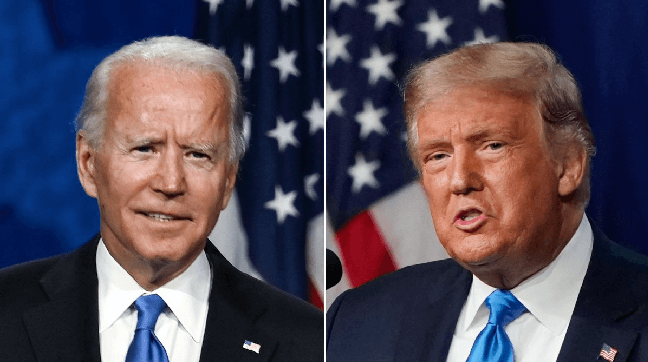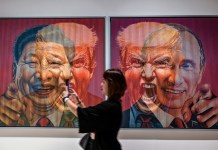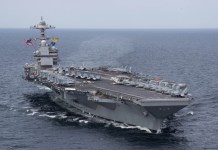The November 3 US presidential election offers a choice between two candidates with markedly different foreign policy platforms that have global implications. While many world leaders prefer former Vice President Joe Biden to win, President Donald Trump is undeterred and even buoyed that many foreign heads of state and policymakers oppose his “America First” policy.
So, what are the election’s likely consequences for Asia and the world?
If Trump Is Re-Elected
A second Trump term would see a continuation of “America First”, i.e., Mr. Trump’s nationalist policy of paring down American security commitments abroad, securing new trade agreements and re-examining Washington’s relationships with international organizations.
In the Middle East, a second Trump administration would continue efforts with supporting Gulf Arab partners and striking peace deals between Israel and Muslim states. While an early effort will be made to forge his own Iran nuclear deal, Mr. Trump will be prepared to maintain a hard line on the regime in Tehran if negotiations are unsuccessful.
A second term for Mr. Trump would likely involve a near-complete withdrawal of US troops from Afghanistan, an attempt at a nuclear arms agreement with Russia, a renewed drive for summitry to negotiate North Korean denuclearization, further squabbles with NATO members over the alliance’s funding and additional demands for Japan and South Korea to increase spending for hosting American forces.
On COVID, a Trump II administration would stay out of the WHO and steer clear of its COVAX project of developing and distributing a coronavirus vaccine.
Concerning China, a new Trump administration would strive to negotiate a Phase 2 trade deal while maintaining US tariffs on Chinese imports, sustain the global campaign of discouraging countries from using Huawei 5G networks, deepen relationships with Asian partners for purposes of challenging Beijing’s claims in the South China Sea and advocating for a free and open Indo-Pacific.
It bears saying that, while China believes that it can strike a better bargain with Biden on trade, many of its “Wolf Warrior” hardline diplomats prefer for Mr. Trump to win.
The calculation is that the Trump administration’s disengagement from international engagements like the WHO and TPP (the Comprehensive and Progressive Agreement for Trans-Pacific Partnership) provides greater opportunity for the Chinese to exert influence beyond their shores and change the American-led postwar order to their benefit.

If Biden Is Elected
Similar to Mr. Trump, Mr. Biden is not inclined for the US to reassume its prior role as the world’s policeman. To demonstrate its commitment to multilateralism, a Biden administration would rejoin bodies like the Paris Climate Agreement, the WHO, the COVAX initiative and possibly the Iran nuclear deal to address global problems.
Mr. Biden would seek a less high-profile approach to North Korea than Mr. Trump, and he would work on repairing relations with NATO, Japan, South Korea and other traditional allies. While abandoning the “America First” moniker, a Biden administration would strive to strengthen American global competitiveness through domestic investments in technology, social programs, innovation, education and infrastructure.
On China, Mr. Biden is likely to try to reinstitute stable, predictable relations with Xi Jinping. His administration will look for ways to work with Beijing on areas of common concern such as climate change, North Korea and COVID-19. However, Mr. Biden would make known his opposition to China’s intellectual property theft, trade cheating, crackdown in Hong Kong and human rights abuses against its Muslim and Christian populations.
Amid the increasingly volatile issue of technology and China, Mr. Biden would likely continue Mr. Trump’s policy of being tough on tech agreements and tech competition out of national security concerns.
With trade, a Biden administration would consider joining the TPP to gain access to new markets, providing an opportunity for the US to influence the region’s next generation of trade policy. Mr. Biden may also continue with President Trump’s practice of levying tariffs as leverage for negotiations.
Additionally, a Biden administration would maintain the current US policy of supporting a free and open Indo-Pacific. Mr. Biden would continue to select arms sales to Taiwan, work with regional Asian partners on security issues in the South China Sea and the East China Sea, enhance security relations with India and attend ASEAN Summits and APEC Forums from which Mr. Trump has been absent.
In Afghanistan, Biden would not reverse Trump’s plans of withdrawing US troops and negotiating a peace deal with the Taliban. In the broader Middle East, Biden would engage Iran (making efforts to rejoin the Iran nuclear agreement), tamper down Mr. Trump’s rock-solid support for Saudi Arabia and Israel in addition to advocating for Palestinian rights and a two-state solution.
Conclusion Trump vs Biden
As with their vastly different domestic platforms, Mr. Trump and Mr. Biden have contrasting foreign policy doctrines on alliances, international agreements, public health and trade.
Yet, there are commonalities in some of their approaches and global values – commonalities that have implications for Asia and the world community.
Both men have misgivings over China’s trade practices, technological competition, IP theft and expansionist policies in regional waters.
The two advocate for a US military withdrawal from Afghanistan and fewer security commitments in the Middle East.
However, the rancor and division of this year’s presidential campaign has drowned out a two-part bipartisan development in American foreign policy:
1) President Trump and former Vice President Biden share a belief that it’s time the United States has a reduced burden on the world stage. This outlook – in part shared by President Obama while he was in office – is a sharp departure from the approach of prior US postwar-era leaders.
2) Neither Mr. Trump nor Mr. Biden feel the obligation to either spread democracy or make it a focus of their foreign policy.
It is during the next presidency when Asia and the world will begin to learn of the consequences of this new US foreign policy approach.
Ted Gover, Ph.D., writes on U.S. foreign policy and is Director of the Tribal Administration Program at Claremont Graduate University.




